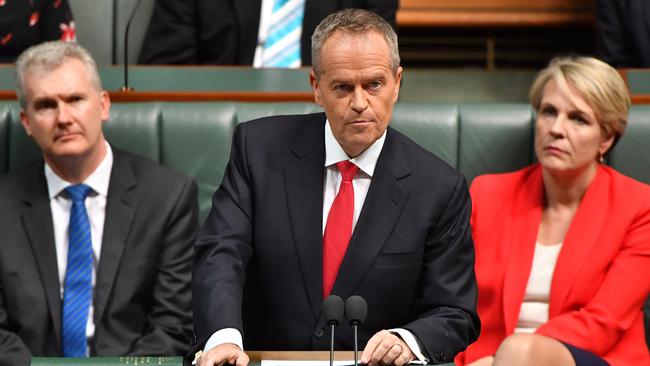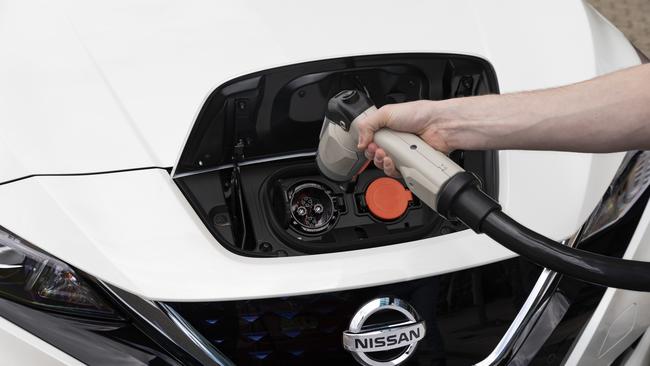Don’t trust this dodgy electric car sales team
Labor has been caught out approaching policy from the perspective of green ideology rather than the practicalities of Australian life, writes Peta Credlin. Just look at Bill Shorten’s electric car promise.
Despite the billions of dollars that both sides of politics threw around in the usual Budget week spending spree — money for this, and money for that, all designed to win over cynical voters ahead of an imminent poll — the one thing that really cut through was that Bill Shorten wants to take your car off the road.
In the suburbs and regional towns where elections are won and lost, this was a game-changer.
Forget the Treasurer’s Budget, last Monday Labor released its long-awaited climate change policy.
RELATED: Voters rate Bill Shorten and Scott Morrison in exclusive YouGov Galaxy poll
Designed to turn our economy upside down, make electricity more unreliable and cost more with a doubling of emissions reduction targets and renewables, and hit farmers with draconian land-clearing laws, as well as demanding 50 per cent of new cars must be electric by 2030, this was the most significant document released last week.
RELATED: How you’ll fare under Labor
Yet, in Canberra’s parallel universe, Labor released a policy like this without any costings and seemingly got away with it.

Costings are the actual dollar amounts for any new policy, calculated over the next four years (called the “forward estimates”), which is the usual time frame for government Budgets. Recent modelling estimated the impact of Labor’s climate policy to be in the order of $472 billion, about half a trillion dollars, yet when their 20-page policy document came out, no financial details were released.
RELATED: Bill Shorten yet to convince his own MPs of the need to buy electric cars
This is a big deal because you will pay for it. And I can’t remember the last time I saw a major policy released without costings.
There are two possible reasons for this: either Labor know the costings and didn’t want to scare off voters by releasing them, or they don’t have the faintest idea. Either way, that’s not how you manage the Australian economy and just shows that none of climate policy madness has been properly thought through.
You want further proof?
On Friday, when asked in a radio interview how long it might take to charge an electric car, Bill Shorten declared, “about eight minutes”. Try eight hours, even longer if you just use your power socket at home and not a fancy $2500 home charger.
Now there’s a reason why scarcely 2000 out of the million-plus cars sold in Australia last year were electric. Electric cars are uneconomic and totally impractical. At almost $50,000, the Nissan Leaf is more than twice the price of a comparable petrol-driven car and with distances less than 300km between charging, hardly suited for most of our weekly commutes.
MORE FROM PETA CREDLIN: Innocent faces hiding a leftie war machine
At present, there are no electric utes, no electric four-wheel drives and no electric heavy vehicles because no battery can handle the daily distances they need to travel or the loads they need to move, and there’s no charging station network comparable to our fuel stations.

Yet Labor will require that 50 per cent of all the vehicles sold in Australia by 2030 — that’s vans, utes, SUVs, trucks and emergency vehicles as well as cars — be fully electric.
This might make sense to someone living in the inner city whose car is an indulgence for the weekend. But no one who needs a ute, a truck or a family-sized SUV as part of daily life, or who is in touch with those who do, could think for a moment that forcing a change to electric vehicles made sense.
Deputy Labor leader Tanya Plibersek is one of a cavalcade of Labor MPs driving cars that far exceed Labor’s proposed vehicle emission rules, which they’re bringing in alongside electric cars. When questioned about it on radio last Friday, she said that she had three kids that she needed to ferry around. And that’s precisely the point. Australians drive the cars they do for a reason.
MORE FROM PETA CREDLIN: When economic bad news is political good news
They need SUVs, 4WDs and utes because they have kids, live in the bush or need to carry around their tools of trade. And none of Australia’s 20 top-selling cars fully comply with Labor’s proposed emissions rules.

Again, Labor has been caught out approaching policy from the perspective of green ideology rather than the practicalities of life in our wide brown land.
Along the way, Labor has also forgotten that, at least in this country, electric cars are actually powered by coal, because that still provides 70 per cent of all our electricity and 90 per cent of off-peak power.
Here are just some of the issues that would need to be addressed before Labor’s electric car fantasy could be realised, and like their costings, all absent in last week’s policy document: how do we establish enough rapid-charging centres to accommodate half a million more electric cars every year, including in regional and remote locations; what new taxes or charges would be necessary to make up for the billions in lost fuel tax; and how can we boost the electricity supply to cope with massive extra demand, and boost the neighbourhood power grid to avoid blackouts when every car is put on charge at night?
MORE FROM PETA CREDLIN: Greens plan would end Australia’s first world lifestyle
Then there’s the problem of sourcing (and disposing of) all the cobalt and lithium needed for the batteries in millions of cars. None of this stopped the Opposition Leader from airily suggesting that, having lost the motor industry we had for decades, we could now start an electric vehicle industry from scratch.
Yes, technical progress might overcome some of these problems in the years ahead, but shouldn’t the would-be PM have at least thought this through before he made it compulsory?
To those who want “more action on climate change”, no practical difficulties count, nor does the cost to taxpayers.
To them, this latest capitulation to the Greens might even make Shorten a hero. But to the rest of us who need our cars, many of them traditional Labor voters, this policy alone should make Labor unfit to govern.
Watch Peta Credlin on Sky News, weeknights from 6pm.



